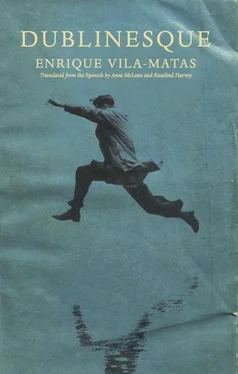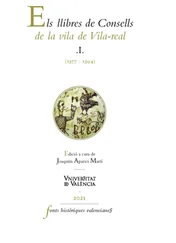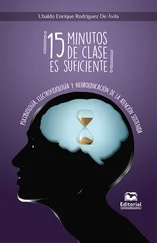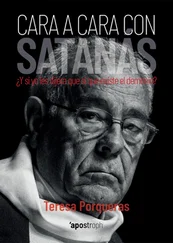Celia, my love, you cannot suspect how slowly the snow is falling through the universe and upon all the living and the dead and upon that young imbecile from Cork.
That’s what he said mentally, though she remained immersed in her indecipherable dreams, faintly illuminated by the light from the hall: her hair all messy, her mouth half open, breathing deeply. The rain lashed wildly against the windows. In the bathroom, one of the taps hadn’t been turned off properly and was dripping, and Riba went to turn it off. The light grew a little dimmer and then began to tremble, as if the world were ending. Although the door to the apartment was closed, it seemed like all that remained was to wait for Duchamp to come back from the sea, come back to get rid of that blasted vase.
It would be best to get used to the idea that Malachy Moore has died. He’d rather think that than speculate on the idea that the Frenchmen he’d met yesterday, Verdier and Fournier, might have played a trick on him to get him to come to the pub again tonight. He doesn’t really know why, but he thinks the voice that told him Malachy Moore was dead had meant it.
But as soon as he’s given him up for dead, he notices that something, in a vague and indistinct tone of protest, has gently begun to deflate in the atmosphere. It’s as if the space through which his shadow normally wanders were emptying itself, and as if with this absence, the previously chilly nape of his neck and his back had begun to heat up. In some part of this room, something is giving way at quite a pace. At such a pace that it already seems to be entirely gone. Someone has left. Maybe that’s why now, for the first time in a long time, it seems there is no longer somebody there lying in wait. Not a single shadow, no trace of the specter of his author, or of the novice who uses him as a guinea pig, no God, no spirit of New York, no sign of the genius he always sought. He feels panic in the midst of this sudden stillness, so extraordinarily flat. And he remembers the flat instant that followed the moment Nietzsche announced that God had died, and then the whole world started living at ground level, miserably.
He could swear he’s entered an ambiguous realm of the deceased, a region that dazzles him in such a way that he can’t look straight at it, as with the sun, which no one can look at for very long. Although at heart, like the sun, this region is no more than a benign force, a source of life. One can be born into it, because one can be born into death. He will try. After all, yesterday that rebirth was possible. He will try to get his faded retired publisher’s life back on track and improve it. But something has completely given way in the room. Someone has left. Or been erased. Someone, perhaps indispensable, is no longer here. Someone is laughing on his own somewhere else. And the rain lashes more and more wildly against the windowpanes and also through the empty and deep-blue air, and what is nowhere and is never-ending.
Since he has a tendency to interpret the events of his world each day with distortions typical of the reader he has been for so long, he now remembers the days of his youth when it was common to argue about the death of the author and he read everything relating to this thorny issue, which worried him more from one day to the next. Because if there was one thing he wanted to be in life it was a publisher and he was already taking the first steps to becoming one. And it seemed like very bad luck that just as he was preparing to find authors and publish them, the figure of the author should be questioned so strongly that people were even saying that, if it hadn’t already, it was going to disappear. They could have waited a little longer, young Riba lamented every day back then. Some friends tried to encourage him, telling him not to worry, because it was only a dubious trend of the French and American deconstructionists.
“Is it true the author has died?” he asked Juan Marsé, who he occasionally bumped into in his neighborhood. That morning Marsé was accompanied by a tall, dark-haired girl with an unforgettable apple-shaped face, and the poet Jaime Gil de Biedma.
Marsé threw young Riba a frightful look, which he still hasn’t forgotten.
“How funny, that’s like asking if it’s true we have to die,” he heard the girl say.
He remembers that he really fancied that woman — facially so similar to Bev Dew, now that he thinks of it — and he also remembers that he even fell suddenly in love with her, the very same as what happened not long ago with Bev. He was especially enamored of her face. Her fresh, fragrant apple face. And also because hanging over her furrowed brow, an impalpable shadow on her face, was an expression that struck him as a direct invitation to love.
“The author is the ghost of the editor,” said Gil de Biedma, half smiling.
And Marsé and the tall girl with the apple face laughed a lot, probably at a private joke he couldn’t share.
Certain scenes from last night come back to him in violent flashes. He remembers when, having already had quite a bit to drink, he was talking to those two Frenchmen at the bar in McPherson’s and at a certain point, after they’d talked of the beauty of the Irish Sea and about the Spanish victory in the European Championship and asked Riba something about the decor of Irish houses, the conversation slid, though he can’t remember why, toward Samuel Beckett.
“I know someone who’s lined his house with Beckett,” said
Verdier.
A house lined with Beckett. He’d never heard of such a thing. In its day — in the days when the publishing house received so many manuscripts — it would have been a good title for one of those novels certain weak and indecisive authors used to submit with titles even feebler and more faltering than they were.
The two Frenchmen, Verdier and Fournier, knew so much about Beckett’s appalling squandered years in Dublin that, between one shot of gin and another, at some point he started calling them Mercier and Camier, the names of two Beckett characters.
Verdier, a great Guinness drinker, was explaining precisely why the key to Beckett’s personality lay in his Dublin years. Sitting in his rocking chair, Riba could not now recall many of the things Verdier told him, but he did remember perfectly hearing about the extremely dangerous game the writer used to play from an early age, when he’d climb to the top of one of the pine trees surrounding the house where he was born and jump down, grabbing a branch just before he crashed to the ground.
Riba remembers perfectly Verdier telling him this, probably because it impressed him more than the other things and perhaps also because it reminded him of what he tended to do with the rocking chair when he rocked it as far back as possible and then dropped back so he could feel himself almost falling, closely linked to the calamitous pretension of the world that he now associated with the death of the author and of everything.
Fournier was also very talkative, and at a certain moment, emphasized again and again that Beckett has always been an example of a writer who risks everything, has no roots, and shouldn’t have any: no family, no brothers or sisters. He comes from the void, said Fournier. Several times he said that he came from the void. The ravages
of alcohol. Riba suddenly remembers the exact moment when he asked Verdier and Fournier if they’d ever seen an individual in Dublin who resembled the young Beckett.
He remembers telling them that, since he’d seen that guy twice over the course of Bloomsday in two different places; it was very likely that they might have bumped into that young Beckett lookalike on more than one occasion.
Verdier and Fournier, almost in unison, told him they knew someone like that. In Dublin this Beckett double was relatively famous, said Fournier. The young double was a great walker, studying at Trinity College, but he was seen all over the city, in the most unexpected places. Many people knew him, yes. He stood out precisely because of his resemblance to the young Beckett; they didn’t think there was anything mysterious about it and believed he was the young Beckett himself, simple as that. Although many in Dublin knew him as Godot. But that wasn’t his name, of course. His name was Malachy Moore.
Читать дальше












